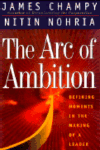 |
 |
| Home |
Search |
Events |
Business Section |
Scholarly Section |
Quality |
About Us & Contact |
| New Business Books Arrivals
Harvard Book Store is located right across the street from Harvard University, and just across the Charles River from the big businesses of Boston, so it should come as no surprise that we have an abiding interest in the world of business books. |
| May | |
|
The Art of Possibility Benjamin Zander, world famous conductor of the Boston Philharmonic Orchestra, and his wife motivate and inspire their audiences with insights in how to keep creative potential alive and well in business life. The Art of Possibility offers a set of breakthrough practices for creativity in all human enterprises. This inspirational book is a synthesis of Rosamund Stone Zander's knowledge of cutting-edge psychology and Benjamin Zander's experiences as the conductor of the Boston Philharmonic Orchestra. In lively counterpoint, the authors provide us with a deep sense of the powerful role that the notion of possibility can play in every aspect of our lives. |
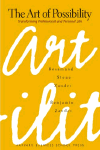
|
| February | |
|
The Future of Success The dizzying exuberance of the Internet-driven marketplace offers unprecedented opportunities. But this technology is also a motor that relentlessly sharpens competition: When consumers can shift allegiance with the click of a mouse, sellers must make constant improvements--by cutting costs, adding value, requiring more time and work from employees whose job stability, in turn, declines daily. In short, the terrific deals of the new economy carry a steep price: more frenzied lives, less security, more economic and social stratification, the loss of time for family, friendship, community, and self. In straightforward, impassioned language, Robert B. Reich clearly delineates what success is coming to mean in our time, and suggests how we might create a more balanced society and more satisfying lives. The Future of Success is a stunning, timely book, certain to galvanize the nation's attention and alter the way we look at our future. |
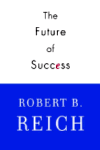
|
| January | |
|
Can Japan Compete? In the years following WWII, Japan rebuilt its shattered economy into one of the world's most competitive nations. By the mid 1980's, the Japanese model -- an economic system that was both more egalitarian and more efficient than the capitalism of the West -- was heralded as the future of business, while American was being dismissed as a failing empire of slow, fat, and lazy workers. Fifteen years later, the original tiger economy is struggling to survive. What happened? The world's leading thinker on global competition, Michael Porter and his colleagues, Hirotaka Takeuchi and Mariko Sakakibara, draw upon ten years of research to untangle the mystery of Japan's economic downfall. In Can Japan Compete? they uncover revolutionary lessons that executives and policy makers from both Japan and the United States wil find invaluable. |
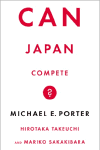
|
| November | |
|
How Digital is Your Business? Hundreds of books have been written about e-commerce and how to develop an Internet strategy, but most of them focus on the challenges of moving an existing business onto the web. This is the first book explaining how to transform a business by adopting a Digital Business Design. With rich case studies and diagnostics, How Digital is Your Business? serves as a guide to making these transformations possible. |
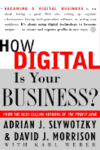
$25.00 (Crown Business, hc, 11/00) |
|
Common Interest, Common Good: A guided tour of the progressive new strategies that contribute to the purpose of our businesses and the prosperity of our communities, Common Interest, Common Good is a convincing, deeply felt book by two authors who have devoted much of their careers to helping public and private sectors find profitable new ways of working together. Many organizations are searching for innovative strategies that will counter the mounting pressures felt by communities and corporations alike. According to Shirley Sagawa and Eli Segal, alliances between for-profit and the not-for-profit industries yield enormous benefits for both. Forward-looking businesses and social sector organizations (both nonprofit and government) can solve many of their problems by working together--while serving the common good in the process. This book showcases many such successful partnerships, from corporate sponsorships and cause-related marketing to employee volunteer programs and school-to-work initiatives. |
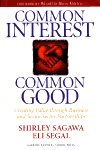
(hc, Dec. 1999, Harvard Business School Press) $27.50 |
| October | |
|
The Trusted Advisor by David H. Maister, Charles H. Green, and Robert M. Galford In today's fast-paced networked economy, professionals must work harder than ever to maintain and improve their business skills and knowledge. But technical mastery of your discipline is not enough, assert world-renowned professional advisors David H. Maister, Charles H. Green, and Robert M. Galford. The key to professional success, they argue, is the ability to earn the trust and confidence of clients. The creation of trust is what earns the right to influence clients; trust is also at the root of client satisfaction and loyalty. The workings of trust are even more critical in the new economy than in the old. Maister, Green, and Galford enrich our understanding of trust -- yet they have also written a deeply practical book. Using their model of "The Trust Equation," they dissect the rational and emotional components of trustworthiness. With precision and clarity, they detail five distinct steps you must take to create a trust-based relationship. Each step -- engage, listen, frame, envision, and commit -- is richly described in distinct chapters. The book is peppered with pragmatic "top ten" lists aimed at improving advisors' effectiveness that can be put to use instantly. It also includes a trust self-diagnostic in the appendix. The result is a tour de force -- brilliant, penetrating, unique. It is essential reading for anyone who must advise, negotiate, or manage complex relationships with others. |

(hc, October, 2000, Free Press) $25.00 |
|
June Arrivals
Drawing on vast new demographic and historical data, Putnam shows how social bonds are the most powerful predictor of life satisfaction while we have become increasingly disconnected from family, friends, neighbors, and social structures. Like defining works from the past that have endured -- such as The Lonely Crowd and The Affluent Society -- Putnam has identified a central crisis at the heart of our society and suggests what we can do. May Arrivals
|
Home | Search | Business | Scholarly | Bargains | Events | About Us | Contact
Copyright 2001 Harvard Book Store
Phone: 800-542-READ FAX: 617-497-1158



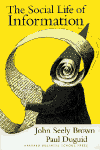
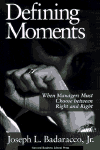 Defining Moments: When Managers Must Choose Between Right and Right
Defining Moments: When Managers Must Choose Between Right and Right